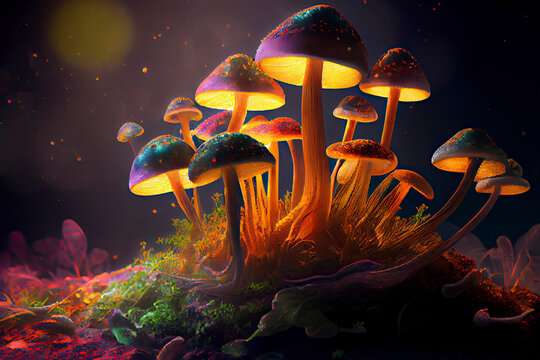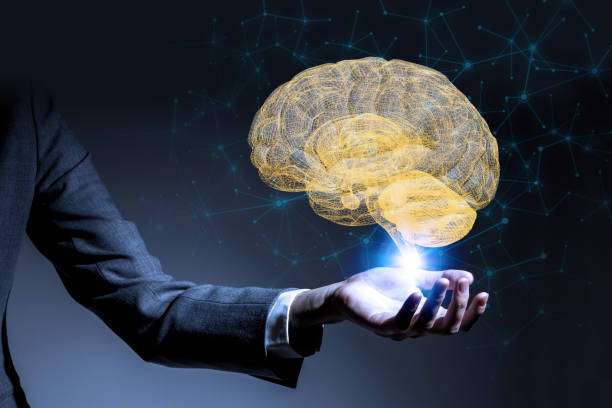Psychedelic substances like magic mushrooms and LSD conjure up images of rave parties and people losing control of rational thought. But what if these misunderstood compounds could treat depression where medications and therapy fail?
New research hints that psychedelics’ bad reputation overlooks their potential as a mental health treatment. Controlled trials have demonstrated fast-acting benefits from psilocybin (magic mushrooms) and similar psychedelics for afflictions like treatment-resistant depression and end-of-life anxiety—the proposed mechanisms center around temporarily altering brain connections to allow more elasticity and new perspectives.
This research has captured the attention of academia and culture alike. Communities in Oregon and elsewhere have voted to allow supervised psilocybin services, given the encouraging early results. At the same time, high-profile figures like author Michael Pollan openly discuss their therapeutic psychedelic use.
But it’s not all peace, love, and flower crowns. Psychedelics remain federally illegal, and research is still early, with some doctors expressing caution until more extensive trials occur. There are also concerns about unsafe use or abuse if availability expands. However, the rapid innovations from top universities imply psychedelic medicine cannot simply be dismissed.
So what role should psychedelic compounds play in mental healthcare and society? Are we witnessing medical breakthroughs or encouraging risky experimentation? As the debate continues, psychedelic research marches steadily into the mainstream – forcing us to reexamine these substances with fresh eyes.
Let’s explore the risks and remarkable opportunities of psychedelic healing.
What Are Psychedelics and How Are They Used?
Psychedelic compounds represent a broad collection of substances that can alter perception, mood, cognition, and sense of self. They have a range of chemical structures and originate from various natural or synthetic sources. Some well-studied psychedelics include:
Psilocybin – The main active compound in “magic mushrooms.” Psilocybin causes psychedelic experiences by stimulating serotonin receptors in the brain.
LSD – A synthetically derived psychedelic. LSD gained popularity in the 1960s counterculture for inducing profound mental shifts. Outlawed for decades, it remains under investigation for therapeutic applications.
DMT – A potent psychedelic compound occurring naturally in plants and animals. It is sometimes synthesized for recreational use. Researchers study DMT’s effects and apparent mystical qualities.
MDMA – Also called molly or ecstasy in recreational contexts. MDMA differs from “classical psychedelics” but causes euphoria and mental stimulation by increasing brain activity of serotonin and other chemicals.
In spiritual contexts, psychedelics entered human history as sacred inebriants, providing access to mystical realms during shamanic rituals and rites of passage. In the modern era, psychedelic research focuses more on medical use-guided sessions to treat conditions like depression, anxiety, PTSD, and addiction, where conventional methods fall short.
With careful protocols and guidance, emerging evidence implies tremendous value for medicine. However, unsupervised usage lacking proper context brings risks. Ultimately psychedelics, like any powerful tool, demonstrate that responsibility matches rewards.
Rewiring The Mind: How Psychedelics Achieve Therapeutic Effects
Many collaborative research efforts are responsible for progressing our understanding of how psychedelics impact the brain. Groundbreaking work at Johns Hopkins University and Imperial College London helps explain the biological mechanisms underlying observed mental health improvements.
Through brain imaging and clinical observation, scientists have identified ways psychedelics alter cerebral blood flow, electrical activity, and network connections in areas linked to mood, behavior, and perception.
A key finding is that psychedelics stimulate the growth of new neurons – called neurogenesis – in the hippocampus. This region plays roles in memory, cognition, and emotional regulation.
Specifically, psychedelic compounds activate specific serotonin receptors. This appears to change communication patterns between brain regions that usually don’t exchange information. Some experts describe this as a “shake-up” of wired connections, allowing more flexibility in thinking, emotion, and one’s sense of self or surroundings.
Subjects in clinical trials corroborate the biological changes, using phrases like “my mind felt renewed” or “I gained a new perspective.” Reports detail anxiety relief, emotional breakthroughs, feelings of catharsis or universality, a renewed sense of meaning and spirituality, and other psychological improvements. For some facing end-of-life pain or treatment-resistant mental illness, psychedelics facilitated profound healing.
So what could the potential uses of psychedelic medicine be? Through its unique action on the brain, psychedelics can help in a variety of mental and physical health issues:
- Psychedelics have been studied for treating addiction, including alcohol and opioid abuse.
- Psychedelic-assisted psychotherapy can help treat depression, anxiety, and PTSD.
- Research suggests that psychedelics could be used to treat cluster headaches and migraine pain.
- Psychedelics may also prove useful in managing end-of-life distress in terminally ill patients.
- Psychedelics show promise as a tool for spiritual exploration or healing modality in the right context and setting.
Whether it’s relieving mental health struggles or giving seekers a safe way to explore consciousness, psychedelic medicine has much to offer those who need it most—and stands poised to revolutionize our world – if only legalization can catch up.
The Long, Strange Trip to Legalization
Psychedelics’ growing medicinal reputation quickly pervaded policy realms in addition to science. Despite lingering controversy, the comprehensiveness of early psychedelic therapy results convinced some lawmakers that blanket prohibition may no longer serve health or society’s best interests.
Jurisdictions like Denver, Oakland, and Santa Cruz passed resolutions effectively decriminalizing psilocybin and similar compounds. Part of the rationale recognized potential mental health benefits from psychedelics that show promise when guided therapeutically. Proponents also cited concerns over criminalization policies that disproportionately harm marginalized groups.
In 2020, Oregon went further – becoming the first U.S. state to legalize the regulated administration of psilocybin services modeled after research protocols. Licensed facilitators guide subjects through psychedelic experiences to heal various mental health conditions. The state will also track outcomes as further evidence guiding safety, efficacy, and best practices.
At the national level, downgrading or removing psychedelics from restrictive federal scheduling could accelerate research and access. Some advocates point to cannabis’s recent shift toward legality once health applications gained recognition. They argue psychedelics may follow a similar appropriate path from the counterculture underground to scientifically validated medicine.
However, others urge caution regarding deregulation. Without further controlled trials on psychedelics’ long-term impacts, some physicians and policy groups express reluctance to expand availability beyond research. There are also legitimate public health concerns if recreational psychedelic use increases without proper education about dosing and the environment.
Psychedelics in the Spotlight: Changing Attitudes Meet Persisting Stigmas
Psychedelic medicine’s promising health applications recently captivated mainstream interest. As clinical evidence mounts, public figures from science, culture, and athletics openly discuss psychedelics’ therapeutic benefits – both personal and societal. However, stigma persists in some realms despite shifting attitudes.
High-profile advocates include author Michael Pollan, gold medal snowboarder Jamie Anderson, and NFL quarterback Aaron Rogers. Each described profoundly positive, life-changing experiences with psychedelics improving mental outlook. Their openness further dismantles outdated misconceptions of psychedelics having no medical value.
Psychedelic culture also permeated entertainment amidst destigmatization. Pollan’s “How to Change Your Mind” explores the science behind psychedelic-assisted therapy for the mass market.
However, experts caution against glamorization absent appropriate context. While psychedelics show therapeutic promise, they remain potent tools requiring supervision according to scientific protocols. Some physicians express concern over media coverage that may encourage recreational experimentation, lacking necessary precautions.
Interestingly – though not altogether surprising – there are generational differences. Younger demographics seem more receptive to evidence-based, non-traditional treatments, while older groups with enduring misperceptions prove more challenging to convince. As science continues dismantling psychedelic stigmas, full societal acceptance may still take time.
Integrating Psychedelics: Caution, Hope and Further Explorations
Psychedelic medicines offer both remarkable promise and reasonable causes for caution as domains requiring continual research.
While evidence of therapeutic efficacy mounts – especially for mental health afflictions unresponsive to traditional treatments – questions persist regarding long-term impacts, ideal protocols, and responsible policies balancing access with public health.
For example, psychedelics have the potential to produce remarkable therapeutic breakthroughs but also contain a risk of short-term harm and permanent psychological damage.
The responsibility for avoiding such serious complications falls on both clinicians conducting research and regulatory agencies charged with determining access, making it imperative that lawmakers know current and future research findings as they consider policy change.
Progress is being made in many areas; however, further exploration is necessary to ensure the safe integration of psychedelic medicines into society.
Join Us As We Explore Psychedelic Potential
Psychedelic drugs still face many obstacles before becoming accepted and accessible treatment options. Overcoming long-held cultural biases against altering consciousness will challenge society’s ability to keep an open yet prudent perspective.
Fittingly, progress requires embracing seemingly contradictory truths simultaneously – remaining open to new paradigms while still applying reason and caution appropriately.
While we cannot yet reach firm conclusions about psychedelics’ risks, uses, and future roles, the growing evidence compels further research. If insights from rigorous future trials match early hopeful signs, psychedelics may catalyze major psychiatry breakthroughs – enabling healing for many still suffering without solutions.
At AlignUs, we believe that the power of open minds, compassionate hearts, and commitment to facts over fear can lead us to the next big revolution in health and wellness. As psychedelics’ full risks and rewards gradually come into focus, we are excited to break the silence, open up conversations, and contribute to the safe exploration of this emerging field!




